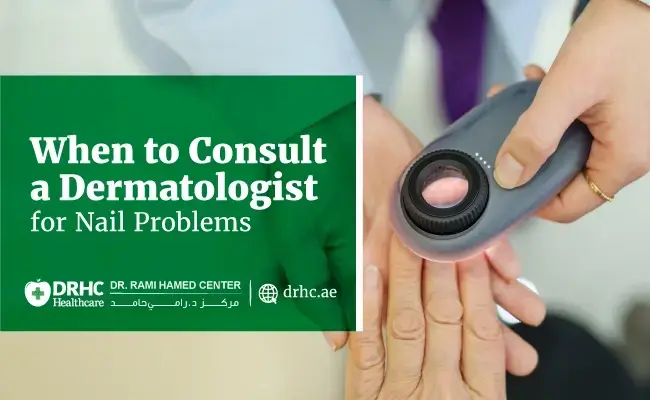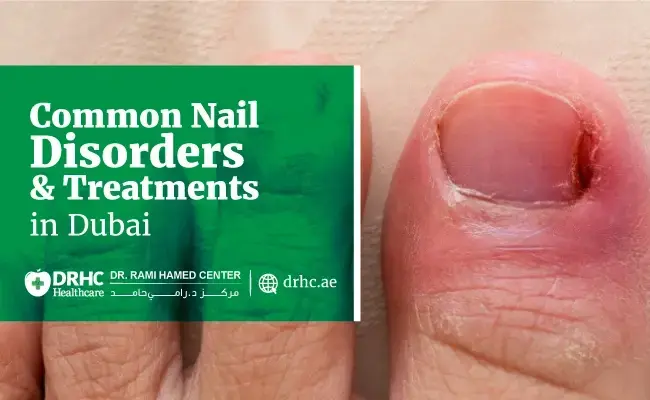
Eczema, or atopic dermatitis, is one of the most common skin conditions affecting children in Dubai and around the world. Parents often feel concerned when they notice their child’s skin becoming dry, red, or itchy — and understandably so. Eczema can cause discomfort, sleepless nights, and frustration for both the child and the family.
At Dr. Rami Hamed Center (DRHC) Dubai, we understand how worrying it can be to manage your child’s sensitive skin. The good news is that with the right care, eczema can be effectively controlled, allowing children to live comfortably and confidently.
Let’s explore the main causes and common triggers of eczema in children — and what parents can do to help manage flare-ups.
What Causes Eczema in Children?
Eczema is not caused by poor hygiene or allergies alone. It is a complex condition involving genetics, immune system response, and environmental factors.
Here are the primary causes:
1. Genetic Predisposition
Children with a family history of eczema, asthma, or allergic rhinitis (hay fever) are more likely to develop eczema. This happens because their skin barrier may be naturally weaker, allowing moisture to escape and irritants to enter more easily.
2. A Sensitive Immune System
In children with eczema, the immune system tends to overreact to irritants and allergens, causing inflammation, redness, and itching. This overactivity can make even mild triggers cause noticeable flare-ups.
3. Weak Skin Barrier
Healthy skin acts as a natural shield that locks in moisture and keeps irritants out. In eczema, this barrier is less effective, which leads to dryness and makes the skin more vulnerable to infections or irritation.
Common Eczema Triggers in Dubai’s Climate
Dubai’s hot and humid weather, frequent air-conditioning, and dusty air can make eczema symptoms more difficult to manage. Identifying and avoiding common triggers can make a big difference in keeping your child’s skin healthy.
1. Climate & Temperature Changes
Frequent shifts between hot outdoor temperatures and cold, dry indoor air can dry out the skin and trigger flare-ups. Using a gentle moisturizer several times a day helps maintain hydration.
2. Dust and Sand
Dust mites and fine sand particles, common in Dubai’s environment, can irritate sensitive skin and worsen itching.
3. Harsh Soaps or Detergents
Many soaps, bubble baths, and detergents strip away the skin’s natural oils, leading to dryness. Opt for fragrance-free, hypoallergenic cleansers to reduce irritation.
4. Certain Fabrics
Synthetic fabrics like polyester and rough materials like wool can irritate a child’s skin. Soft, breathable cotton clothing is usually best.
5. Food Allergies or Sensitivities
Some children with eczema may react to foods such as eggs, milk, nuts, or wheat. However, this varies for each child and should be discussed with a dermatologist or allergy specialist at DRHC Dubai before making dietary changes.
6. Sweat and Heat
Sweating is a common trigger for itching, especially in children who play outdoors. Frequent but short lukewarm showers can help reduce irritation without over-drying the skin.
7. Stress or Lack of Sleep
Emotional stress can sometimes worsen eczema symptoms. Ensuring adequate sleep, calm routines, and emotional support can help reduce flare-ups.
How Parents Can Help Manage Eczema
While eczema cannot be “cured,” it can be successfully managed with consistent care and medical guidance. At DRHC Dubai, our dermatology team recommends a personalized care plan that includes:
- Moisturizing regularly with gentle, fragrance-free creams or ointments.
- Avoiding known triggers, such as harsh soaps, excessive heat, or certain foods (if identified).
- Using prescribed creams or medications to reduce inflammation and itching when flare-ups occur.
- Maintaining a balanced diet and proper hydration to support healthy skin.
- Scheduling regular follow-ups to monitor skin progress and adjust treatment as needed.
Frequently Asked Questions (FAQs)
1. Can eczema go away on its own as my child grows?
In many cases, eczema improves with age. However, some children may continue to have sensitive skin into adulthood, requiring ongoing care.
2. Is eczema contagious?
No, eczema is not contagious. It cannot be passed from one person to another through touch or contact.
3. How often should I bathe my child?
Short, lukewarm baths once daily or every other day are usually sufficient. Always follow up with moisturizer within minutes after drying the skin.
4. When should I see a dermatologist?
If your child’s eczema causes severe itching, bleeding, or sleep disturbance, or if home care doesn’t help, it’s time to consult a specialist. At DRHC Dubai, our dermatologists can identify the root cause, prescribe tailored treatments, and guide you through effective management steps.
Eczema Care at DRHC Dubai
At Dr. Rami Hamed Center, we offer comprehensive dermatology care for children with eczema and other skin conditions. Our approach focuses on:
- Accurate diagnosis of triggers and causes
- Gentle, child-safe treatments
- Education and guidance for parents on daily skin care routines
Our goal is to help your child live comfortably, with reduced flare-ups and healthier, happier skin.
Conclusion
Eczema can be challenging, but understanding its causes and triggers is the first step toward control and relief. With Dubai’s unique climate, the right skincare routine and professional support are essential.
At DRHC Dubai, our dermatology team provides personalized care plans that help soothe irritation, prevent flare-ups, and improve skin health over time.
If your child is experiencing persistent itching, redness, or dry patches, schedule a dermatology consultation at DRHC Dubai. Together, we can help restore comfort — and confidence — to your child’s skin.
📞 Call / WhatsApp: +97142798200
📍 Visit Us: Dr Rami Hamed Center, Dubai Healthcare City
🌐 Website: www.drhc.ae
Topic: Dermatology







.webp)

Leave a comment